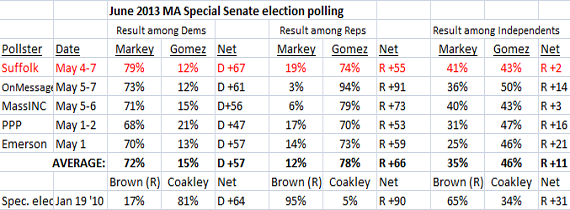 |
| A Thursday, March 7, 2013 Boston Herald spotlight on the 2013 Massachusetts Senate Primary and Special Election |
Suffolk University released their first MA Senate special election survey late last week, and found notably better news for the Democratic nominee than the first four post-primary surveys have shown. With the race just six weeks away, Ed Markey leads Gabriel Gomez (R) 52-35%, according to a survey taken May 4-7:
On June 25th the General election for U.S. Senate will be held. The three candidates listed on your ballot are Gabriel Gomez -- Republican, Ed Markey -- Democrat, and Richard Heos -- Twelve Visions Party. For whom would you vote or toward whom do lean at this time?
Gabriel Gomez (R) -- 35%
Ed Markey (D) -- 52%
Richard Heos (TVP) -- 1%
Undecided/Refused -- 12%
If Suffolk is right, then Gomez must be struggling to perform as strongly with crucial groups as Scott Brown in his successful January 2010 special Senate election. The cross tabs certainly bare that out as well.
While Suffolk finds the racial make-up of the 2013 special election to be very similar to that of the 2010 contest, Gomez is currently performing much weaker with white voters than Scott Brown. The latter won this group 55-44% in 2010, while the former only manages 35% in the Suffolk poll (to Markey's 53%). Considering that white's make up 85% of Suffolk respondents, an 18 point deficit with whites would demolish any Republicans chances, very quickly.
Fortuntaely for the Gomez campaign, however, is the fact that Suffolk is the only post-primary MA special election pollster so far to show Gomez trailing so much among white voters. Consider the chart below:
The three pollsters to sample this race following the primaries found Markey leading Gomez among whites by no more than 3 points. If you average the four pollsters, Markey leads Gomez among whites 46-39% , and 54-25% with non-whites. As noted in the final row of the chart above, this won't quite cut it for a Republican upset in June.
In terms of partisan identification in the Suffolk poll, while Gomez looks strong with his own party, he's not doing nearly well enough among Democrats and Independents (the only winning formula for a Bay State Republican). He only picks up 12% of Democratic voters, while barely carrying Independents 43-41%. At the same time, 19% of Republicans say they'll back Gomez's Democratic opponent.
Compare those numbers to Scott Brown in 2010, and you'll see why Gomez is in trouble. Brown manged to win 17% of Democrats, while only losing 5% of Republicans to Coakley (D). But that's not what won it for him. It was his very impressive winning margin among Independents that gave him his Senate seat., carrying them by a whopping 31 points (65-34%). Since the primary, Gomez has averaged a 46-35% lead among Independents.
So while PPP, OnMessage, and Emerson College have shown Markey with impressive leads among independents, they're not large enough for him to win the race. Meanwhile, MassINC and Suffolk see no Independent advantage for Gomez:
Finally, Suffolk finds that Gabriel Gomez has been unable to limit the infamous (and overused) gender gap with female MA sepecial electoin voters, something Scott Brown did quite well in 2010. While the other four post-primary polls on the race have found Gomez leading Markey among men, , Suffolk actually finds Ed Markey carrying men, by double digits at that (48-37%). Even worse for the Republican, Markey leads among women 56-33%. But based on other polls, Suffolk appears to be an outlier in this respect:
As nearly always the case, there's good and bad news in the polling for the Gomez and Markey campaigns. A simple average would indicate that though Gomez is close, he's just not performing up to Scott Brown's 2010 numbers. While he's generally ahead among men and Independents, it's not by much, and he trails by double digits among women. And though it's neck and neck among white voters, that's not enough for a Republican to win in Massachusetts.
But on the upside for Republicans, Gomez's worst poll, the new Suffolk survey, appears to be an outlier. As a result, the race still appears to be winnable for either candidate. Perhaps more importantly than that, Gomez is performing well compared to where Scott Brown stood at this point in 2010. In fact, Brown didn't see his first poll lead until January 10, 2009, just 9 days before the special election.




No comments:
Post a Comment
Note: Only a member of this blog may post a comment.